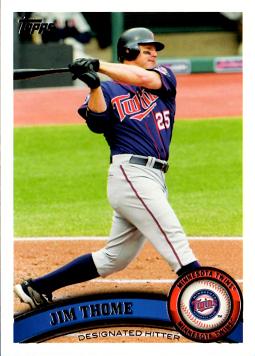A few thoughts on everyone's favorite half-giant, Jim Thome, while I ponder the fact that since the last time I wrote here (just a little more than two weeks ago, before the big move and starting a new job and so forth), Dan Uggla's OPS has gone up about a hundred points:
- Thome's been a Hall of Famer for like five years now. He hit his 500th home run way back in 2007. His 70.8 rWAR is fourth among active players (behind A-Rod, Pujols, and Chipper, and ahead of Jeter), and tenth all-time among first basemen (using a 40% cutoff; Thome didn't quite play half of his career games at first). If you hear anyone speak of his 600th home run as though it makes or even just significantly strengthens his Hall of Fame case, you have my permission to slap them.* Hard.* Case made, quite a while ago. Big round numbers are fun, but not necessary.
- That said, is anyone actually doing or saying those things? I feel like a lot more people are complaining about his being underrated than are actually underrating him at this point. Yeah, over the course of his career, he's been unfairly overlooked. Now, though, I think almost everyone realizes how great he's been (more or less), and I don't get the sense that many more Hall of Fame voters would pick him today than would have yesterday morning (there are a few that wouldn't in either case, but they're morons beyond hope and aren't worth discussing). I could be wrong.
- Speaking of being overlooked during his time, though, Thome has started just two All-Star Games and made just five All-Star teams. The game wasn't even instituted until Babe Ruth's second-to-last full season, and he started two ASGs. No one else in the top eleven in homers started fewer than five or been named to fewer than seven.
- Thome was drafted as a shortstop, played 40 games there in the minors, and then played exclusively third base until his age-26 season. As a rookie, he looked like this, then quickly got huge. He hit with modest power in the minors, then averaged just 34 homers per season from age 24 to 29, then 46 per season in his five healthy seasons between ages 30 and 35. I'd never accuse anybody of taking anything -- I have no evidence, and if I did, I wouldn't care -- and least of all Thome, possibly my favorite active player. But it just illustrates to me how insane the whole PED witch hunt is. It seems to me that there's exactly as much evidence of PED use in Thome's career as in Jeff Bagwell's (that is to say, no evidence), but that one is assumed to be "clean" and one "dirty" for no reason I can figure other than that Thome apparently enjoys the hell out of a cheeseburger, fries and a beer every now and again.
- Or maybe I'm wrong, and maybe people do suspect Thome. Or will come to sometime in the next six or seven years. That's even more ridiculous, so much so that I don't even think I can talk about it.
- As Craig Calcaterra pointed out on Twitter, Thome hit his first home run when "I Adore Mi Amor" by Color Me Badd was the #1 song in the country. Also worth noting: Thome was drafted in 1989, before Mike Stanton, Jason Heyward, and Starlin Castro were born. When he made his MLB debut a bit over two years later, on September 4, 1991, the youngest player of the 2011 season to date, Mike Trout, turned four weeks old. The pitcher off of whom he hit that first home run, Steve Farr -- and it was a ninth-inning two run homer that turned a 2-1 loss to the Yankees into a 3-2 Cleveland win -- is now 54 years old. Thome went 0-for-4 with a walk and two K's against Nolan Ryan, now 64.
* My permission has no legal effect. Don't slap people.







